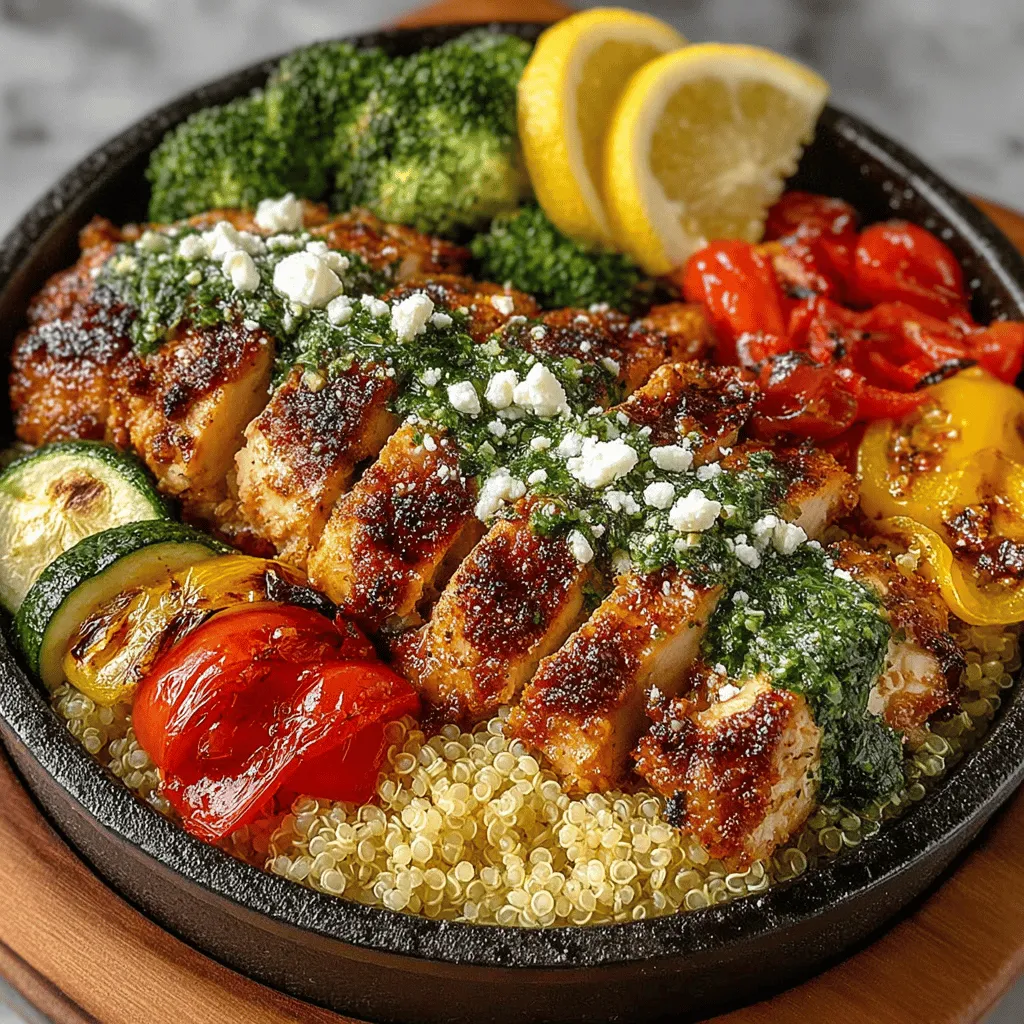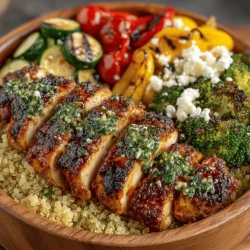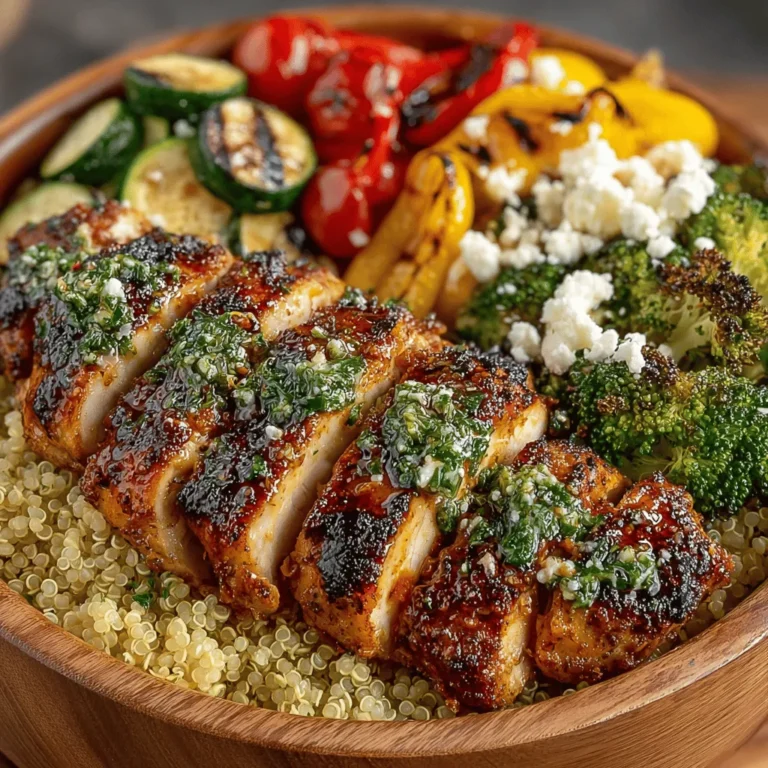Introduction to Lemon Herb Grilled Chicken and Veggie Bowls
In the realm of healthy and delicious meals, Lemon Herb Grilled Chicken and Veggie Bowls shine as a perfect choice for any occasion. This dish not only tantalizes the taste buds with its vibrant flavors but also provides a nourishing balance of protein, vegetables, and whole grains. Whether you’re looking for a quick weeknight dinner or a meal prep option for the week, these bowls are versatile and satisfying. In this article, we will delve into the recipe, explore the health benefits of the ingredients, and guide you through the process of creating these delightful bowls.
Ingredients
– 2 boneless, skinless chicken breasts
– 1/4 cup olive oil
– 1/4 cup fresh lemon juice
– Zest of 1 lemon
– 3 cloves garlic, minced
– 2 tablespoons fresh parsley, chopped
– 1 tablespoon fresh thyme, chopped
– Salt and pepper to taste
– 1 cup quinoa or brown rice
– 1 cup broccoli florets
– 1 cup cherry tomatoes, halved
– 1 red bell pepper, sliced
– 1 zucchini, sliced
– Optional: additional herbs for garnish
Instructions
1. Prepare the Marinade: In a bowl, whisk together olive oil, lemon juice, lemon zest, minced garlic, parsley, thyme, salt, and pepper.
2. Marinate the Chicken: Place the chicken breasts in a resealable plastic bag or a shallow dish and pour the marinade over them. Seal the bag or cover the dish and refrigerate for at least 30 minutes, preferably 1-2 hours.
3. Cook the Grains: Rinse quinoa or brown rice in cold water. Cook according to package instructions and set aside.
4. Prep the Vegetables: While the chicken is marinating, wash and cut the broccoli, cherry tomatoes, red bell pepper, and zucchini.
5. Preheat the Grill: Heat your grill to medium-high heat, ensuring it’s hot enough for a good sear.
6. Grill the Chicken: Remove the chicken from the marinade, letting excess drip off. Grill for 6-7 minutes on each side or until fully cooked (internal temperature should reach 165°F).
7. Grill the Vegetables: Place the vegetables on the grill. Cook for about 5-7 minutes, turning occasionally, until tender and slightly charred.
8. Assemble the Bowls: In each bowl, place a serving of quinoa or rice, sliced grilled chicken, and a generous portion of grilled vegetables. Garnish with additional herbs if desired.
Understanding the Recipe: Ingredients Breakdown
Chicken Marinade Essentials
The marinade is crucial for infusing the chicken with flavor and moisture. Lemon juice and zest not only enhance the taste but also tenderize the meat. Olive oil contributes healthy fats while garlic and fresh herbs add depth and aroma.
Vegetable Selection and Preparation
Selecting the right vegetables is key to a balanced bowl. Broccoli is packed with vitamins, while cherry tomatoes provide sweetness. Red bell peppers offer a crunch, and zucchini adds a mild flavor. Proper prepping ensures each vegetable retains its flavor and texture when grilled.
Base Ingredients: Quinoa and Rice
Both quinoa and brown rice serve as nutritious bases for your bowls. Quinoa is a complete protein, making it an excellent choice, while brown rice offers hearty fiber. Cooking methods vary slightly, so it’s essential to follow package instructions for the best results.
Step-by-Step Instructions for Lemon Herb Grilled Chicken and Veggie Bowls
Marinating the Chicken: A Crucial Step
The marination process is vital for flavor infusion. A minimum of 30 minutes is recommended, but longer marinating times, up to 2 hours, will yield even more flavorful chicken. Ensure every piece of chicken is coated evenly for the best taste.
Preparing the Vegetables: Techniques and Tips
Cutting vegetables uniformly ensures even cooking. Season them lightly with salt and pepper before grilling to enhance their natural flavors. Timing is key; start grilling the chicken first, as it requires longer cooking time.
Grilling the Chicken: Achieving Perfection
For perfectly grilled chicken, aim for a grill temperature of around 375°F to 400°F. Cooking times may vary based on thickness, so always check for doneness with a meat thermometer.

Signs of Doneness for Chicken
When grilling chicken, achieving the right level of doneness is crucial for both safety and taste. Use an instant-read thermometer to check the internal temperature; the chicken should reach at least 165°F (75°C) to be considered safe to eat. Additionally, you can gauge doneness by looking for clear juices running from the chicken rather than pink. The meat should also feel firm but not hard when pressed.
Resting the Chicken: Why It’s Essential
After grilling, let the chicken rest for about 5-10 minutes before slicing. This resting period allows the juices to redistribute throughout the meat, resulting in a more tender and flavorful bite. Slicing too soon can cause the juices to run out, leaving you with dry chicken.
Grilling the Veggies: Timing and Techniques
Grilling vegetables alongside your chicken can enhance the meal’s flavor and nutritional value. Here are some best practices to ensure perfectly grilled veggies.
Best Practices for Grilling Vegetables
Choose vegetables that grill well, such as bell peppers, zucchini, asparagus, and red onions. Cut them into uniform sizes to ensure even cooking. Toss them in olive oil, salt, and your choice of herbs or spices before grilling. This not only adds flavor but also helps prevent sticking.
How to Achieve the Perfect Char Without Overcooking
For a perfect char, preheat your grill to medium-high. Place the veggies directly over the heat and monitor them closely, turning occasionally to achieve an even char. Remove them from the grill when they are tender but still crisp; this usually takes about 5-10 minutes, depending on the type of vegetable.
Using Grill Baskets vs. Skewers
Grill baskets are fantastic for smaller or cut vegetables that might fall through the grates. They allow for easy tossing and flipping. Skewers, on the other hand, are great for larger pieces; just remember to soak wooden skewers in water for at least 30 minutes to prevent burning.
Assembling the Bowls: Creating a Beautiful Presentation
The way you assemble your bowls can make a significant difference in both appearance and enjoyment.
Layering Ingredients for Visual Appeal
Start with a base of grains, such as quinoa or brown rice, followed by the grilled chicken and veggies. Layering allows different flavors to meld together while also making the bowl visually appealing. Consider using varying colors of vegetables to create a vibrant dish.
Suggestions for Portion Sizes
Aim for balanced portions: approximately 1/2 cup of grains, 4-6 ounces of protein, and a generous serving of vegetables. This ensures that each bowl is satisfying without being overwhelming.
Importance of Garnishing for Flavor and Presentation
A sprinkle of fresh herbs, like parsley or cilantro, can brighten the dish visually and add an extra layer of flavor. Lemon wedges on the side provide a fresh burst of acidity that can elevate the entire bowl.
Serving Suggestions and Variations
Garnishing Your Bowls
Fresh parsley and lemon wedges are classic garnishes that enhance both flavor and presentation. The acidity of the lemon complements the grilled chicken beautifully.
Optional Toppings: Crumbled Feta Cheese and Their Flavor Contributions
Adding crumbled feta cheese can introduce a creamy, tangy element to the bowls. This addition not only enhances the flavor profile but also provides a boost of calcium and protein.
Variations on the Recipe
Substituting Proteins
For those looking for alternatives to chicken, consider using tofu for a vegetarian option, or shrimp for a seafood twist. Both options grill well and absorb flavors beautifully.
Seasonal Vegetable Swaps for Year-Round Enjoyment
Take advantage of seasonal produce by swapping in vegetables that are fresh and local. For example, in the summer, try corn and cherry tomatoes, while in the fall, consider butternut squash and Brussels sprouts.
Additional Flavor Enhancements with Spices or Sauces
Experiment with different spices or marinades to customize the flavor of your chicken and veggies. A touch of smoked paprika, a drizzle of balsamic glaze, or a sprinkle of chili flakes can add exciting dimensions to your bowl.
Health Benefits of Lemon Herb Grilled Chicken and Veggie Bowls
Nutritional Value of the Ingredients
This dish combines lean protein from chicken, fiber from quinoa, and a variety of vitamins and minerals from the vegetables. Each ingredient contributes to a well-rounded meal.
Benefits of a Balanced Meal
Incorporating protein, fiber, and healthy fats into your meals supports sustained energy and overall health. This balanced approach can help maintain weight, improve digestion, and promote overall well-being.
Conclusion: Embracing Healthy Eating with Lemon Herb Grilled Chicken and Veggie Bowls
Incorporating Lemon Herb Grilled Chicken and Veggie Bowls into your meal rotation is a delicious way to prioritize healthy eating. With their vibrant flavors, colorful presentations, and nutritional benefits, these bowls provide a satisfying meal that can be enjoyed any day of the week. By understanding the ingredients, following the preparation steps, and exploring variations, you can create a dish that not only nourishes the body but also delights the palate. Embrace the fresh flavors of this recipe and enjoy a wholesome dining experience that celebrates the beauty of healthy cooking.



